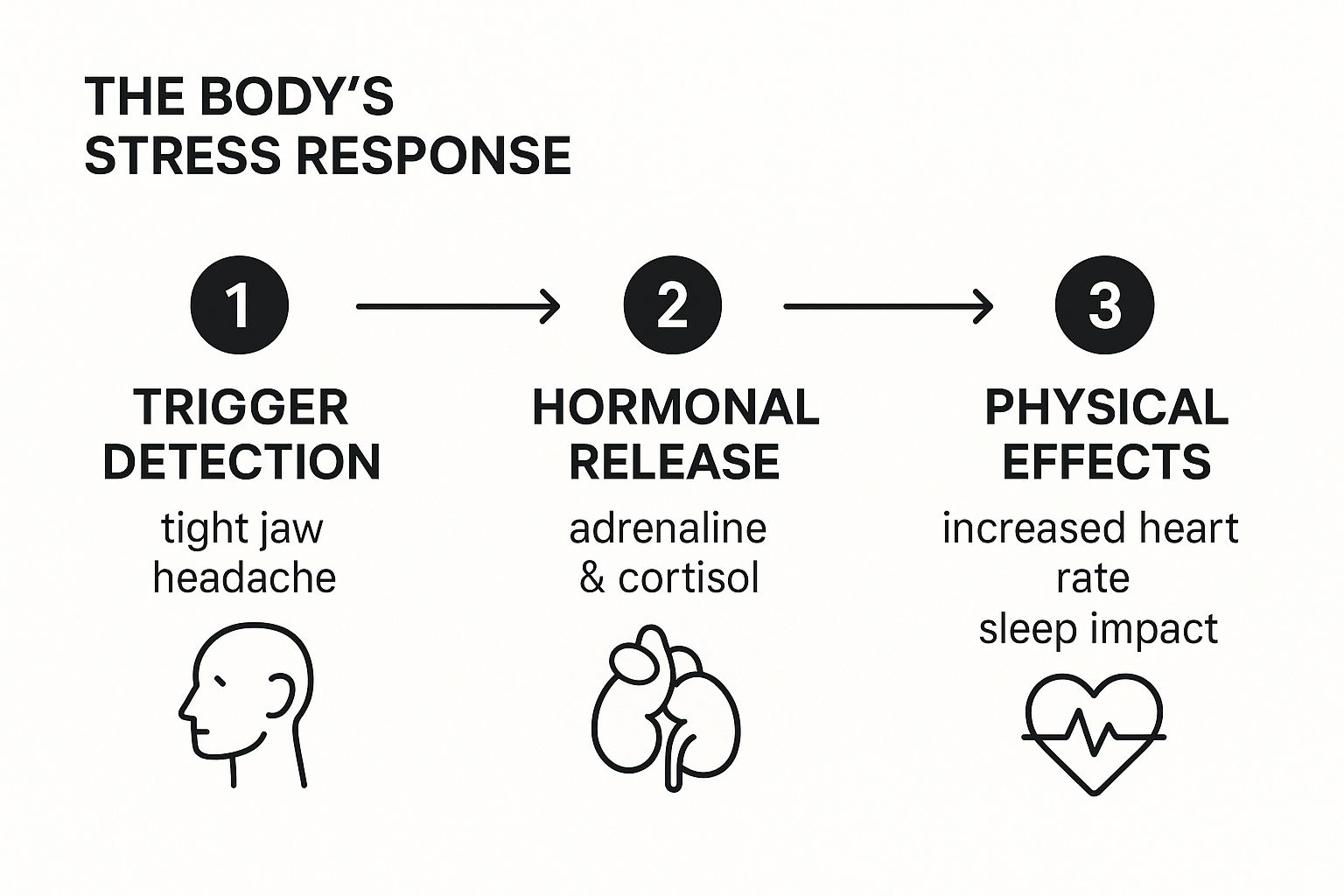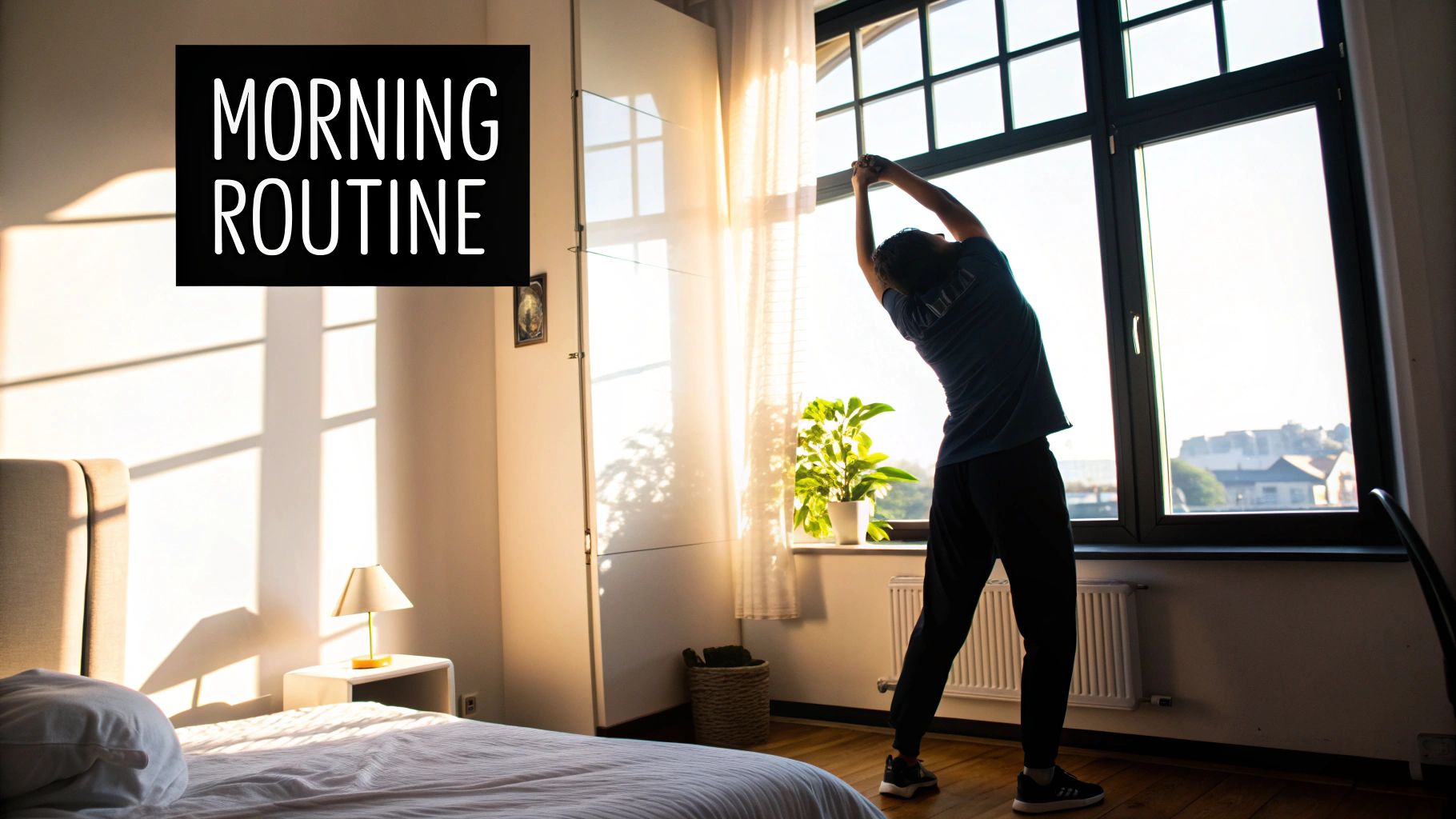Jan Elvis
12.10.2025

Jan Elvis
12.10.2025
If you want to get a handle on stress, you first need to understand what's happening under the hood. Your body has this built-in alarm system, the classic "fight-or-flight" response. It's an ancient survival mechanism, fueled by hormones like cortisol and adrenaline, that's supposed to save you from, say, a saber-toothed tiger. The problem is, in modern life, that alarm gets tripped by deadlines, traffic, and social pressure, and it never really shuts off.
Learning to recognize the early warning signs is the single most important step you can take to get back in the driver's seat before stress completely takes over.
Before you can fight back, you have to know your enemy. This isn't some boring biology lecture—it's about getting real about what’s going on inside your body when you feel that pressure building.
Think of it this way: when you perceive a threat—whether it’s a big presentation at work or just an awkward conversation—your brain sounds the alarm. It immediately floods your system with two key hormones: adrenaline and cortisol.
Adrenaline is what gives you that instant jolt. Your heart pounds, your focus sharpens, and you're suddenly wide awake. Cortisol is the backup, keeping you on high alert by pumping glucose into your bloodstream for a quick energy boost.
This system is a lifesaver in a genuine emergency, but it's toxic when it's running 24/7. When stress becomes chronic, these hormone levels stay jacked up, messing with everything from your concentration to your ability to get a decent night's sleep.
Even worse, it shows up in subtle physical ways that are all too easy to brush off.
Pay attention to these common red flags:
These aren't random aches and pains. They're your body's check-engine light, screaming that you're running on empty. Catching them early is the whole game. The moment you notice your jaw is tight, for example, that's your cue to step away for five minutes, stretch, and consciously release that tension.
This infographic breaks down how a simple trigger can snowball into a full-blown physical reaction.

As you can see, what starts in your head doesn't stay there. It creates a domino effect that impacts your entire body.
The first real step to regaining control is simply identifying what's setting you off. If you find that most of your stress comes from social situations, that's a huge piece of the puzzle. For a lot of guys, that's a major source of anxiety, and learning how to overcome social anxiety can be a game-changer that goes hand-in-hand with managing overall stress.
Want to go a bit deeper? Hearing from an expert who specializes in this stuff can offer a new perspective. These stress reset expert insights provide a solid look into the mechanics of managing your body's stress response.
By connecting the dots between the science and what you're actually feeling day-to-day, you can shift from just reacting to stress to getting ahead of it. Knowing your personal warning signs is what allows you to step in before things spiral, and that’s the foundation for building real, lasting resilience.

How you spend the first few minutes of your day pretty much dictates how you'll handle pressure later on. Think about it. If the first thing you do is grab your phone and dive headfirst into a storm of notifications and bad news, you're starting the day on defense.
Let's flip that. You can build a powerful buffer against stress in 20 minutes or less. This isn't about cramming more into your morning; it's about laying a solid foundation before the world starts throwing things at you. A well-built routine gives you a sense of control and an early win.
The first step is incredibly simple: move your body. I'm not talking about a grueling, hour-long gym session. The goal here is just to wake yourself up and get the blood flowing, shaking off that morning grogginess.
A few minutes of dynamic stretching—think arm circles, leg swings, and torso twists—can make a world of difference. Physical activity is one of the best natural stress-busters out there. Even a brisk 10-minute walk is proven to release endorphins, your body's built-in mood elevators that help take the edge off. You can learn more about how exercise acts as one of the most effective stress relievers on mayoclinic.org.
Right after that, spend five minutes just breathing. I know it sounds a bit cliché, but this is a game-changer for grounding your mind and settling your nervous system.
Try this simple 4-7-8 technique:
This sends a direct signal to your body that you’re safe, which can help lower cortisol levels and bring on a sense of calm before you even think about checking your email.
The goal isn't to eliminate stress but to build a strong internal foundation so that external pressures have less of an impact. A solid routine is your first line of defense.
The last piece of the puzzle is fueling your body the right way. What you eat for breakfast has a massive impact on your energy and mood for the rest of the day. If you skip it or just grab a sugary cereal bar, you're setting yourself up for an energy crash and a seriously short fuse later.
Instead, go for something that gives you a good mix of protein, healthy fats, and complex carbs.
These kinds of meals keep your blood sugar stable, which means you avoid those energy spikes and crashes that make you feel even more stressed out. This whole sequence—movement, breathing, and a smart breakfast—takes just 20 minutes and gives you a huge advantage. Building this kind of structure is a key part of personal productivity, and our guide on how to manage time effectively has more tips for making new routines stick.
To make this even easier, here's a simple, actionable schedule you can follow to build resilience against daily stress.
| Time Allotment | Activity | Purpose and Benefit |
|---|---|---|
| 5 Minutes | Light Stretching or Walk | Wakes up the body, boosts blood flow, and releases mood-lifting endorphins. |
| 5 Minutes | 4-7-8 Breathing Exercise | Calms the nervous system, reduces cortisol, and centers your focus for the day. |
| 10 Minutes | Balanced Breakfast | Stabilizes blood sugar, provides sustained energy, and prevents mood swings. |
Think of this table not as a rigid set of rules, but as a framework. You can tweak the activities to fit what works for you, but the principle remains the same: take control of your first 20 minutes, and you'll be far better equipped to handle whatever the day throws your way.

Let’s be honest. The thought of sitting cross-legged in a silent room trying to "clear your mind" probably sounds more stressful than relaxing. If your brain goes into overdrive the second you try to quiet it down, you’re not broken. You’re normal.
The good news? Mindfulness isn't about achieving some perfect state of Zen. It’s a practical skill, not a spiritual test. Think of it as doing reps at the mental gym. Every time you consciously pull your focus back to what's happening right now, you’re strengthening your ability to stay grounded when life throws a curveball.
It’s really about breaking that knee-jerk reaction to stress. Instead of instantly spiraling when a problem pops up, mindfulness creates a tiny bit of space. In that space, you get to choose how you respond instead of letting your stress run the show.
Forget the meditation cushion. The best way to get started is by weaving small moments of awareness into the things you’re already doing every single day. That's how it becomes a habit that actually sticks.
Here are a few ways to practice mindfulness without ever formally "meditating":
Mindful Coffee: Tomorrow morning, try this. Instead of doom-scrolling while the coffee brews, just focus on the process. Listen to the gurgle of the machine. Smell the grounds. Feel the warmth of the mug in your hands. When you take that first sip, really taste it. That's it. You just practiced mindfulness.
The 3-Minute Body Scan: Got a tough meeting or a difficult conversation coming up? Find a quiet corner for just a few minutes. Close your eyes and do a quick mental scan from your toes to the top of your head. Just notice what you feel—tension in your shoulders, a tight jaw, your feet on the floor. Don’t judge it, just notice. This simple act yanks you out of your racing thoughts and grounds you in the present.
Mindful Walking: On your way to grab lunch, leave your phone in your pocket. Just walk. Pay attention to the rhythm of your steps and the feeling of the pavement under your shoes. Notice the sounds and sights around you without putting a label on them. You’re not trying to accomplish anything. You’re just walking.
The point isn't to stop your thoughts. That's impossible. It's about learning to watch them come and go without letting them drag you away.
There’s no single right way to do this. For a lot of guys, movement-based practices just click better. Research consistently shows that activities like yoga can be a powerhouse for stress reduction, sometimes even more so than standard relaxation techniques. It’s because you’re combining physical exertion with focused breathing and awareness—hitting multiple targets at once. You can learn more about how yoga and mindfulness reduce stress and see the science behind it.
The real key is to experiment. Find what actually works for you.
Maybe it’s a five-minute guided session on an app before you crash for the night. Or maybe it’s just putting on your headphones and focusing on a single album from start to finish, with no distractions.
Whatever you choose, the goal is the same: practice bringing your full attention to one thing at a time. That’s how you build the mental muscle to stay anchored when things get chaotic.

Sometimes the most effective way to beat stress is the simplest one, and it's waiting right outside your door. Getting into a natural environment is more than just a pleasant change of scenery; it's a scientifically proven method for dialing down your body's stress response.
When you spend time in nature, you're actively lowering the amount of cortisol—the primary stress hormone—in your system. Think of it as hitting a reset button for your brain and body. Your mind gets a chance to quiet down, your focus sharpens, and the best part is it costs absolutely nothing.
You don't have to plan some epic, multi-day hike into the backcountry to feel the effects. The real trick is to weave small, consistent moments of nature into your daily grind, even if you're stuck in the city with a packed schedule.
Making it work is easier than you think. Try a few of these:
The objective is to make deliberate contact with green spaces. Solid research shows that even quick exposures—we're talking just 10 to 50 minutes—can genuinely lift your mood and lower physical stress indicators like blood pressure. If you're curious about the science, you can discover more about these findings on how nature impacts stress and see the data for yourself.
This is a core component of learning how to reduce stress naturally—using the powerful resources you already have access to.
A short walk in a park is more than just a break from your screen. It’s an active investment in your mental well-being, helping to clear your head and lower your stress hormones with every step.
Want to supercharge the benefits? Try blending your nature time with other stress-busting techniques you’re learning. A simple walk can become a potent mindfulness exercise if you just leave your phone in your pocket and fully engage with what's around you.
Focus on the physical sensations. Feel the breeze on your skin, listen to the rustle of leaves, notice the different shades of green in the trees. This simple act yanks your mind out of those anxious, repetitive thought loops and anchors you in the here and now.
Look at it as an active recovery session for your mind. By consciously connecting with nature, even for just a few minutes a day, you build a powerful habit. It becomes a reliable, on-demand tool for managing pressure and staying centered, no matter what kind of chaos your day throws at you.
What you eat and how you sleep are the cornerstones of your ability to handle whatever life throws at you. You can't expect to feel calm and in control if you're constantly running on fumes. This isn't about some restrictive diet or a military-style sleep schedule; it's about making simple, smart choices that give your body the raw materials it needs to manage stress.
Think of your body like a high-performance car. You wouldn't put cheap, low-grade fuel in a Ferrari and expect it to run smoothly. The same logic applies to you. Highly processed foods, loads of sugar, and too much caffeine are like that cheap fuel. They cause your energy to spike and then crash, which just cranks up the volume on stress and anxiety.
When you're under pressure, it's easy to reach for junk food for a quick hit of comfort. This creates a vicious cycle. Understanding this connection is key, which is why it's worth exploring strategies to stop stress eating to get back in control.
The goal here is to stabilize your system, not send it on a rollercoaster. Focus on bringing in foods that actually support your nervous system and help keep your stress hormones in check.
Even tiny changes add up. For example, swapping that second afternoon coffee for a cup of herbal tea can cut down on jitters and set you up for better sleep later on.
Your diet is a tool. Use it right, and you're giving your body the chemical building blocks it needs to stay balanced and resilient, no matter what your day looks like.
Good sleep doesn't just happen by accident, especially when you're stressed. You have to intentionally create the right conditions for it. Chronic stress and bad sleep are locked in a nasty feedback loop: stress keeps you up at night, and a lack of sleep makes you way more vulnerable to stress the next day. Breaking that cycle is a non-negotiable for your mental health.
Start by creating a tech-free buffer zone for at least an hour before you plan to go to sleep. The blue light blasting from your phone, TV, or laptop messes with your body's production of melatonin—the hormone that signals it's time to power down. Use this time for something analog. Read a book, listen to some chill music, or just stretch.
Next, get your environment right. Your bedroom should be as dark, quiet, and cool as possible. A cool room actually mimics your body's natural temperature drop as it preps for sleep, making it easier to drift off.
Finally, remember that winding down is part of self-care. A solid evening routine that includes good personal hygiene can be incredibly calming. Taking a few minutes to use quality grooming products signals to your brain that the day is done and it's time to unwind. It's all connected. For more on this, check out our guide on how to smell good naturally.
Look, even with the best game plan, you're going to have questions as you get into the rhythm of managing stress naturally. That’s normal. Let's tackle some of the most common things guys wonder about, from how long it actually takes to feel a change to knowing when it’s time to call in the pros.
Getting clear on this stuff from the start helps you set real expectations and stick with it, especially on days when you just don't feel like it.
This is the number one question, and the honest answer is: it's both immediate and gradual. Some things, like the 4-7-8 breathing technique, can dial down your stress in the moment. Think of it like hitting a reset button when you feel your anxiety spiking.
But the real, deep-rooted change—that feeling of being fundamentally less on-edge and more in control—that comes from sticking with it. You'll likely notice small wins within the first week or two, maybe a bit more energy or a slightly better mood. It's more like a dimmer switch slowly getting brighter, not a sudden flick of a light switch.
The power here is in the accumulation of small, daily actions. You're not just putting a band-aid on the symptoms; you're rewiring how your mind and body handle pressure.
For a noticeable shift in how you manage stress, give yourself a solid 3-4 weeks of consistency. That’s about how long it takes for a new habit—like a solid morning routine or daily exercise—to become second nature and for the physical benefits to really kick in.
We’ve all been there. It’s the ultimate paradox: you’re too stressed out to do the things that will relieve your stress. This is where most guys drop the ball. The key isn't to magically find motivation; it's to make the habits so easy that you don't need motivation.
First, start embarrassingly small. Don't try to go from zero to one hundred. Just pick one thing. Seriously, one. Maybe it's a five-minute walk on your lunch break or swapping one of your five daily coffees for a glass of water.
Then, use a little trick called habit stacking. Link your tiny new habit to something you already do automatically. For instance: "After I brush my teeth in the morning, I will do one minute of deep breathing." It hooks the new behavior onto an existing one, so you don't have to think about it. And if you miss a day? Who cares. The goal is progress, not a perfect record. Just pick it back up tomorrow, no guilt attached.
These natural strategies are powerful, but they aren’t a cure-all. You have to know when a problem is bigger than your current toolkit. These techniques are here to support your well-being, not to replace professional medical care.
It might be time to talk to a doctor or therapist if you're noticing any of these signs:
There is absolutely no shame in asking for backup. A professional can help you figure out what's really going on and build a structured plan, which might include therapy or other treatments. It’s like calling in a specialist when your car is making a noise you can’t fix yourself. It's smart, and it's a sign of strength.
At Main Character, we believe taking charge of your well-being starts with building strong, daily routines. Our line of men's personal care products is designed to be the foundation of that routine, helping you look and feel your best so you can tackle stress head-on. Elevate your self-care and build the discipline you need by exploring our collection.